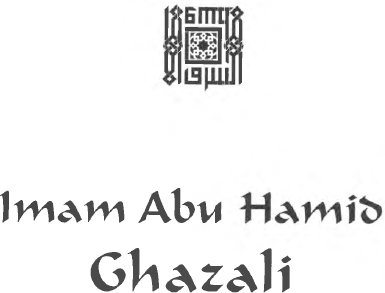Published and distributed by Islamic Publications International, PO Box 705, Oneonta, NY 13820. USA
Telephone: 800-568-9814 Fax: 800-466-8111
Email: Islampub@Islampub.com
Copyright © 2001 by Islamic Publications International Printed in the United States of America
All right reserved under international and Pan-American Copyright Conventions. No part of this publication may be reproduced by any form, or by any means electronic or mechanical, including photocopy, recording of any information storage and retrieval system, now known or to be invented without the written permission of the publisher.
First Edition 2001
Algar, Hamid
Imam Abu Hamid Ghazali: an exponent of Islam in its totality / Hamid Algar — 1st ed.
p. cm.
Includes bibliographical references and index. LCCN: 00-101051
ISBN: 1-889999-15-6
eISBN: 978-1-4835834-9-5
1. Ghazzali, 1058-1111. 2. Theologians, Muslim —Biography. 3. Sunnites—Biography. 4. Sufis— Biography. I. Title
| B753.G34A46 2000 |
297'.4'092 |
| QBI00-462 |
Director of Publications: Moin Shaikh
General Editor: Giv Nassiri
Cover Design: Kathy Yang Chen
Text Design and Composition: Archetype Typography
Index: Robyn Brode
Imam Abu Hamid Ghazali
Extracts from the Writings of Ghazali
Chronology of Ghazali’s Era
Chronology of Ghazali’s Life
Bibliography
Works of Ghazali in Translation
Index


When examining the intellectual and spiritual history of Islam, or for that matter any other major human community, to speak of great figures or important individuals carries with it a danger of distortion, for the maintenance and perpetuation of a religious or cultural tradition is clearly dependent on more than the efforts of individuals. There is something arbitrary and artificial in classifying the scholars of the past as either great, first-ranking figures, or as persons of lesser importance. Very frequently in the evaluation of our history we fall prey to the problems that are inherent in this scheme of things, leading us to say that after a certain time in our history no great figures emerged. This is simply because according to our conventional historiography no important names in a given field emerged after a certain date. Furthermore, the history of a given civilization, culture or tradition is necessarily the history of its totality, not simply of a few individuals contributing to it. This having been said, it remains indisputable that there are in the history of every community certain individuals who played a role, which while not indispensable, was nonetheless qualitatively and quantitatively more important than that of their predecessors or those who came after them.
It may be in this sense that we can interpret the well known hadith ascribed to the Prophet (saw) in which he is reported to have spoken of the emergence of a mujaddid, a renewer, who will come at the beginning of every century of the Islamic era. Not one who will reform religion, which by definition does not need reforming, but rather one who will renew it by restating, elaborating, and exemplifying its essential principles with new force and vigor. It might be profitable to explore the history of Islam with a view to discovering those who in each century of the Islamic era fulfilled this function of tajdid, of renewal. In many centuries it would be difficult or at least controversial to identify a single individual as having been the mujaddid, for the function of tajdid may have been shared by several individuals. There are, however, certain individuals whom tradition with near-unanimity identifies as having been the mujaddidin of their respective centuries. By the amplitude and profundity of their work and their influence they indeed gave a new impetus to the spiritual and intellectual life of the community, not simply for their own century but for many centuries afterwards. Certainly one such individual is Imam Abu Hamid Ghazali, the subject of this lecture.
In the evaluation of Ghazali some people have in fact gone so far as to say that he is the greatest of all authorities on Islam after the Prophet himself. We may lay aside such exaggerations, but there is no doubt that he is one of the major figures in the Islamic tradition; it is fair to say that he exemplifies or personifies the codification of the Sunni Islamic tradition in its classical form. This may sound like a pedantic definition but its meaning and justification will, I hope, become apparent.
These days in the West it is conventional, not to say fashionable, to avoid the simple rehearsal of biographic data when attempting to assess the career of a given individual. But it has to be said that with respect to traditional Muslim scholars such as Ghazali, there is such a close interconnection between life and work that to establish a chronological framework for the life of the individual in question is indispensable. From the outward events of the life of Ghazali we can deduce a pattern of spiritual development which is necessarily reflected in his written works, his main legacy to the Islamic umma.





